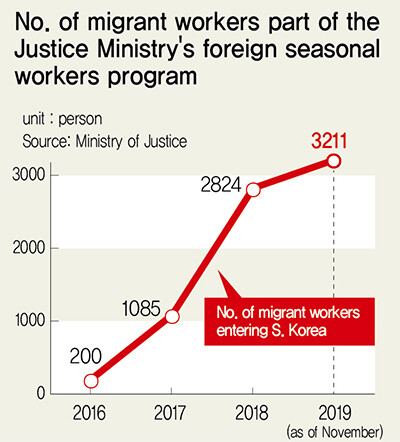hankyoreh
Links to other country sites 다른 나라 사이트 링크
Seasonal foreign workers regularly stripped of wages by brokers in worker-exchange program

“A,” 32, and “B,” 35, are workers from the city of Santa Rosa in the Philippines who arrived in South Korea in September of last year through the Ministry of Justice’s “foreign seasonal worker program.” The program is a system that provides short-term three-month employment visas for migrant workers in farming and fishing villages during the busy season. Out of the 1.75 million won (US$1,497) per month the two received for their rice and cabbage harvesting work in Haenam County, South Jeolla Province, the two paid 250,000 won (US$214) to their employer for housing. Yet their bank statement showed another 750,000 won (US$642) -- half their 1.5 million won (US$1,283) in remaining pay -- had been sent elsewhere.
When they asked about the reason, they found that the 750,000 won had been transferred into the account of a South Korean broker. They inquired with the Haenam county office, which explained that an agreement had been reached in the contract with Santa Rosa prior to their arrival to prevent illegal sojourns. According to the office, the amount was supposed to be settled after their return home. But there was nothing about the agreement in the contract A and B had signed with their broker in the Philippines. When they eventually returned home, A had not received 2.25 million won (US$1,925), amounting to half his pay over the three-month period; B had failed to receive 1.5 million won, or half of two months’ pay.

When it introduced the foreign seasonal worker program in 2015, the Ministry of Justice (MOJ) prohibited the involvement of domestic and overseas brokers. In practice, however, brokers are frequently taking part and collecting pay from migrant workers within their intermediary role.
The foreign seasonal worker program entered full-scale operation in 2017 after a test run in October 2015. As of November 2019, a total of 3,211 migrant workers had entered South Korea through the system. The system is one in which South Korea and overseas local governments engage in worker exchange efforts based on work agreements. According to the MOJ’s 2019 framework for the program, the conditions for local government applications state that neither South Korean nor overseas brokers may be involved or mediate in the work agreements, and that brokers are not allowed to receive placement fees.
But brokers continue to play a part in the process. Out of 41 seasonal workers who arrived in Pocheon, Gyeonggi Province, from Panchapuri in Nepal during June and July 2019, 18 left without returning home. The reason was found to be that the migrant workers had only worked for three months, despite having paid airplane fare and brokering fees to a private broker when Pocheon and Panchaburi signed their work agreement. An analysis of the foreign short-term seasonal worker system and study of general improvements published in December 2018 by Lee Hye-gyeong, a professor of public personnel studies at Pai Chai University, found five of the 29 local governments examined were being referred to migrant workers through brokering businesses.
“I don’t think there’s a single case of work agreements among local governments where there aren’t brokers involved,” a South Korean broker said in a telephone interview with the Hankyoreh.
In the Santa Rosa case, brokers in the Philippines and South Korea were involved from the time the agreement was being formed between the local governments. The Haenam county office explained that “the business was selected by Santa Rosa, so we have been unable to ascertain the specific contract details.”
A Ministry of Justice senior official said, “We are intensifying after-the-fact punishments, including the exclusion of local governments from the following year’s foreign seasonal worker allocation when cases are found of placement and transaction fees being charged.”
By Kang Jae-gu, staff reporter
Please direct comments or questions to [english@hani.co.kr]

Editorial・opinion
![[Column] Season 2 of special prosecutor probe may be coming to Korea soon [Column] Season 2 of special prosecutor probe may be coming to Korea soon](https://flexible.img.hani.co.kr/flexible/normal/500/300/imgdb/original/2024/0426/3317141030699447.jpg) [Column] Season 2 of special prosecutor probe may be coming to Korea soon
[Column] Season 2 of special prosecutor probe may be coming to Korea soon![[Column] Park Geun-hye déjà vu in Yoon Suk-yeol [Column] Park Geun-hye déjà vu in Yoon Suk-yeol](https://flexible.img.hani.co.kr/flexible/normal/500/300/imgdb/original/2024/0424/651713945113788.jpg) [Column] Park Geun-hye déjà vu in Yoon Suk-yeol
[Column] Park Geun-hye déjà vu in Yoon Suk-yeol- [Editorial] New weight of N. Korea’s nuclear threats makes dialogue all the more urgent
- [Guest essay] The real reason Korea’s new right wants to dub Rhee a founding father
- [Column] ‘Choson’: Is it time we start referring to N. Korea in its own terms?
- [Editorial] Japan’s rewriting of history with Korea has gone too far
- [Column] The president’s questionable capacity for dialogue
- [Column] Are chaebol firms just pizza pies for families to divvy up as they please?
- [Column] Has Korea, too, crossed the Rubicon on China?
- [Correspondent’s column] In Japan’s alliance with US, echoes of its past alliances with UK
Most viewed articles
- 1AI is catching up with humans at a ‘shocking’ rate
- 2After election rout, Yoon’s left with 3 choices for dealing with the opposition
- 3Is Japan about to snatch control of Line messenger from Korea’s Naver?
- 4South Korea officially an aged society just 17 years after becoming aging society
- 51 in 5 unwed Korean women want child-free life, study shows
- 6[Column] ‘Choson’: Is it time we start referring to N. Korea in its own terms?
- 7Korea’s 1.3% growth in Q1 signals ‘textbook’ return to growth, says government
- 8No good, very bad game for Korea puts it out of Olympics for first time since 1988
- 9[Editorial] Japan’s rewriting of history with Korea has gone too far
- 10Why Korea shouldn’t welcome Japan’s newly beefed up defense cooperation with US